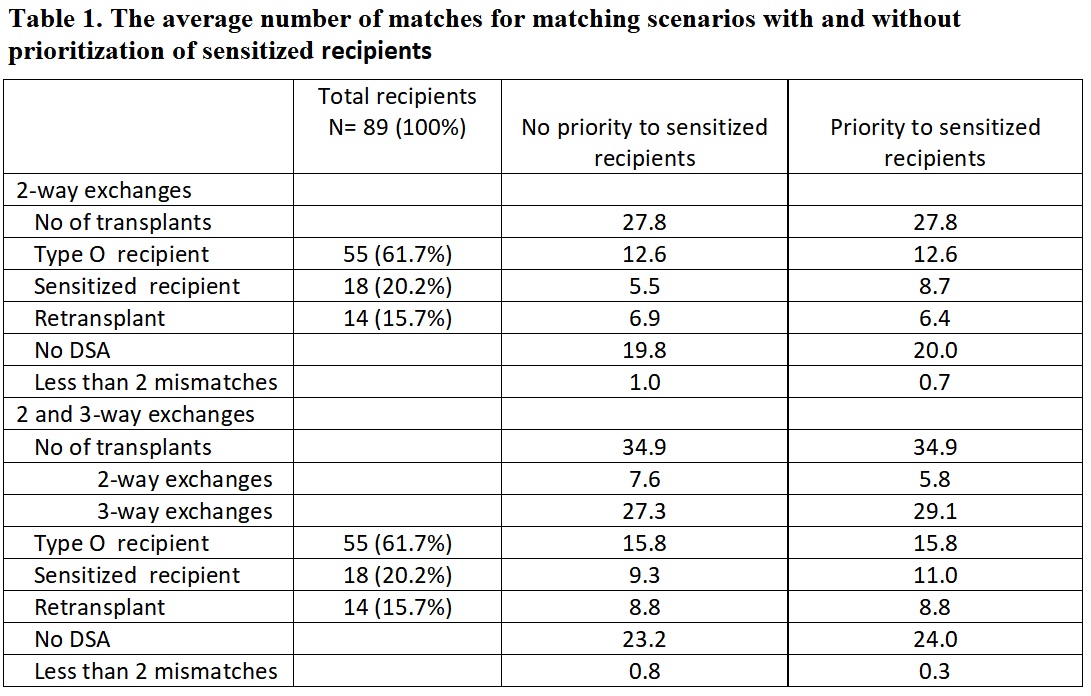Kidney Paired Donation in Brazil
1Transplant, Santa Casa de Misericordia de Juiz de Fora, Juiz de Fora, Brazil, 2King Abdullah University of Science and Technology, Thuwal, Saudi Arabia, 3US Naval Academy, Annapolis, MD, 4JHU, Baltimore, MD
Meeting: 2020 American Transplant Congress
Abstract number: A-028
Keywords: Donation, Kidney transplantation, Living donor
Session Information
Session Name: Poster Session A: Kidney Paired Exchange
Session Type: Poster Session
Date: Saturday, May 30, 2020
Session Time: 3:15pm-4:00pm
 Presentation Time: 3:30pm-4:00pm
Presentation Time: 3:30pm-4:00pm
Location: Virtual
*Purpose: It is estimated that up to 30% of potential living donor/recipient pairs are unable to proceed to living donor kidney transplantation (LDKT) for immunological reasons (ABO incompatibility or positive crossmatch). Kidney Paired Donation (KPD) programs are conducted in various countries for over 20 years, but in Brazil this kind of exchange is prohibited by law. Our goal was to estimate the potential increases in LDKT if KPD were implemented in Brazil.
*Methods: We did a retrospective analysis from 1/2013 to 4/2019 of all the immunologically incompatible donor/recipient pairs in a single center in Brazil. ABO-incompatible donors did not have HLA testing performed, so we randomly assigned HLA to them based on the pool of previous donors from our service. Donor/recipient pairs were considered compatible if they had ≤2 DSAs with MFI sum <3000. An optimized algorithm was used to estimate the number of matches in Brazilian KPD program. Two scenarios with and without prioritization of highly sensitized recipients (PRA >80%) were considered. For each scenario we conducted 10 simulated KPD match runs and determined the average increase in number of transplants. We also simulated 2 different programs: One allowing only 2-way exchanges and another allowing 2 and 3-way exchanges.
*Results: In the period 100 pairs were denied transplant for immunological reasons, involving 89 different recipients of whom 20% were sensitized. The results of the simulated KPD match runs are shown in Table 1. Considering the transplants made in our center in the same period, a KPD program could increase the LDKT up to 22.4%; the number of highly sensitized recipients transplanted could increase by 78.6%.
*Conclusions: A KPD program can substantially increase LDKT, especially for highly sensitized recipients. As the waitlist in Brazil is increasing faster than the number of transplants, KPD is a promising strategy to increase the donor pool and increase access to KT.
To cite this abstract in AMA style:
Bastos J, Mankowski M, Gentry S, Massie A, Bisi C, Duarte C, Colares V, Segev D, Ferreira G. Kidney Paired Donation in Brazil [abstract]. Am J Transplant. 2020; 20 (suppl 3). https://atcmeetingabstracts.com/abstract/kidney-paired-donation-in-brazil/. Accessed February 17, 2026.« Back to 2020 American Transplant Congress

